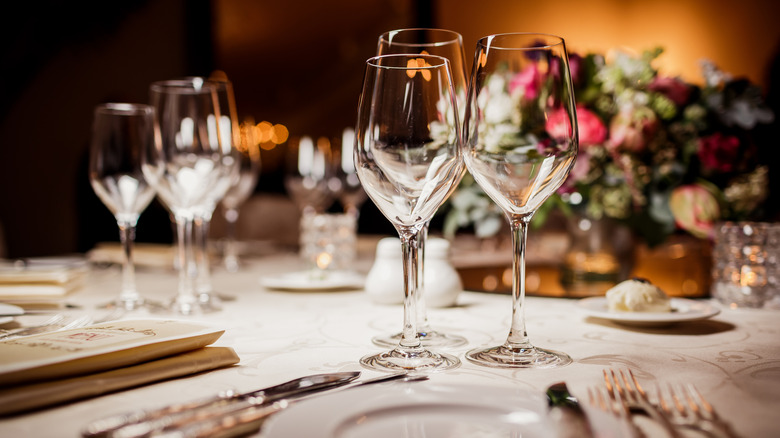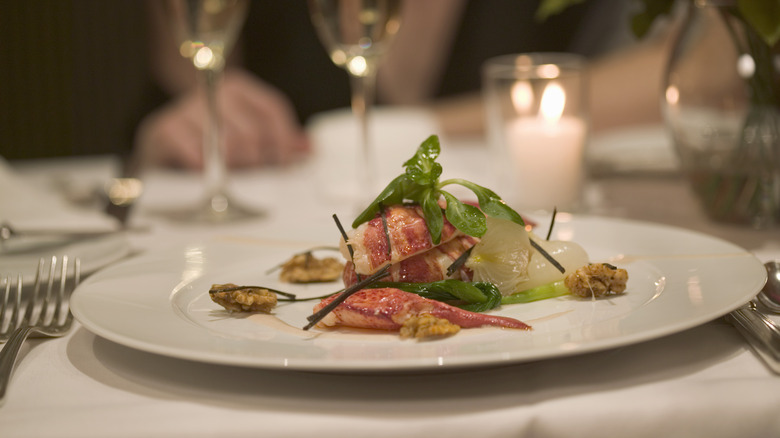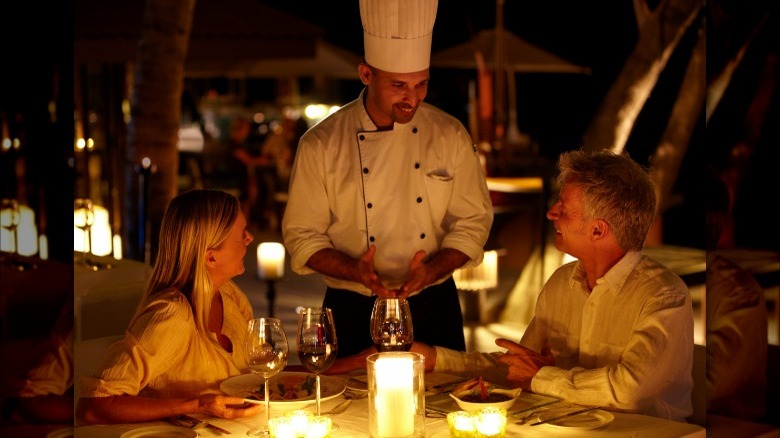How To Make Your Questionable Fine Dining Habit Less Unsavory
If you haven't seen "The Menu," this is a formal spoiler alert. In the film, two upper-class luxury dining fanatics visit a $1,250-per-person restaurant 11 different times, but when asked under life-or-death stakes, they can't name a single dish they'd eaten there.
The scene is clearly a caricature meant to expose a careless show of wealth, but, in the real world, it's tough to argue that self-identifying as a "foodie" or "just really appreciating the experience" is justification enough to drop a few hundred dollars on a meal while others are scrambling to fork over the same amount for rent. During a recession, the ethics of fine dining become even more complicated.
Of course, the fact that folks may be struggling to pay their bills and buy food doesn't mean fine dining fans can't treat themselves every once in a while. The important thing here is approaching fine dining the right way to avoid feeling (and looking) like a jerk. Economic disparity is a labyrinthian mire, and how one individual chooses to navigate it is less on them than on the institutions that perpetuate that disparity in the first place. But if you have a bad taste in your mouth after splurging during a recession, it's probably for a reason. Luckily, there are a few ways to make your questionable fine dining habits less unsavory.
Enjoy yourself tastefully
It's human nature that, when times get hard, people want to treat themselves. Writing for Psychology Today, Tchiki Davis, Ph.D. says one of the most impactful self-care strategies is "veer[ing] away from your normal schedule and tak[ing] the time to do something just for yourself." If a fancy dinner falls under this category and you can afford it, rock on — but don't be a jerk about it. Unlike other self-care strategies like going on a hike or an at-home spa day, it's best to avoid sharing a fine dining experience with gratuitous Instagram posts.
Posting a photo of that $400 Laurent-Perrier Alexandra Rosé 2004 you ordered for the table is a bad look, especially if some of your friends are struggling with the grocery bill every week — and there's a good chance that they are. According to Morning Consult, per Forbes, 16.5% of U.S. consumers said regularly paying for groceries was an uncertainty for them in March 2022. Considering that figure was only 8% in March 2021, the issue is getting worse, not better.
A recent Reddit thread posed the question "What has gotten so expensive that you just don't buy it anymore?" and the products named are anything but glamorous. (We're talking fast food, frozen pizzas, cereal, canned soups, butter, and soda). In a Tasting Table survey, a full 73% of respondents shared they were considering switching from name-brand items to save money on groceries. If you can afford that bottle of Dom Perignon or Masa omakase experience, by all means, enjoy it! But don't rub it in, especially if it's a weekly habit. One photo is more than enough to share your life with your friends, they don't need a play-by-play of your meal — and they definitely don't need to know how much it all cost.
Support the restaurant industry
It's no secret that the last few years have been particularly hard on the restaurant industry. Record-high inflation has led many establishments to raise menu prices to offset higher operating costs, which often ends up driving away customers who may be hurting financially themselves.
Last October, fine dining giant Wolfgang Puck told Yahoo! Finance operating costs had gone up 15% in his restaurants. "I bought the other day cutting boards, for example," says Puck. "For one restaurant I bought 12 cutting boards, I spent $1,500, and then a week later, it went up to $2,000." 2022 also saw a global grain and cooking oil shortage due to export blockades from the Russia-Ukraine conflict, not to mention the ongoing climate crisis and a global pandemic. Your decision to eat out ensures that these establishments are able to stay open. At the end of the day, servers carrying $60 appetizers to your table are still servers, chefs cooking those $200 steaks are still chefs, and the restaurant industry is infamous for being underpaid and overworked terrain. Food service workers need to work, and in order to have a job, they need to have a place to be employed.
To that effect, if you want to help give new restaurants a fair shot in this competitive market, swing by a recently-opened or lesser-known fine dining establishment. Manhattan foodies are doubtlessly familiar with Thomas Keller's Per Se: a killer spot to indulge in a gourmet night out, it's world-famous for a reason. But, 30 minutes south in the East Village is fine dining restaurant HAGS, which also rocks and has a fraction of the notoriety. Trying out new places instead of visiting the same ones over and over again can help budding establishments thrive. Absolutely have a mind-blowing meal at Per Se one weekend, but the next time you dine out, support that new venture by an up-and-coming chef — and their staff.
If you're going out, leave a fat tip
When you treat yourself to a fancy dinner, you might not be the only one who benefits — if you do it right. Your decision to "dine fine" keeps people employed, but to that effect, tip fat.
A cancerous phenomenon known as "tip fatigue" has surfaced in recent months as high inflation has made some customers think tipping is too expensive and has become optional. Generally, tips are thought of as a way of expressing recognition for "above-and-beyond" service. But, in the restaurant industry, an above-and-beyond server takes a customer's order with a smile and a total sense of self-erasure, no matter what. If you're brave enough to utter the words "I don't feel obligated to tip," wear a t-shirt with the phrase "Privileged and Proud" emblazoned across the front in block letters. It's the same thing.
Either leave the sense of entitlement at home or leave your going-out outfit in the closet. Unless you're tipping, your business isn't really helping anybody other than yourself and maybe the restaurant owner. Though the fight for a $15 minimum wage is heavily associated with fast and fast casual establishments, fine dining workers are still largely underpaid. Your business (literally) puts food on the table in more ways than one — but only if you tip.
If you're still feeling weird about indulging, consider donating some of your fine-dining budget to local food pantries and live large a little less often. (You might even be able to hone your cooking game with a little more practice — and we have recipes to help with that.) At a minimum, abdicating any sort of guilt you're feeling will ease the indigestion when you do sit down for that foie gras.



